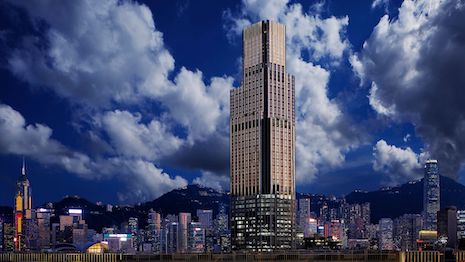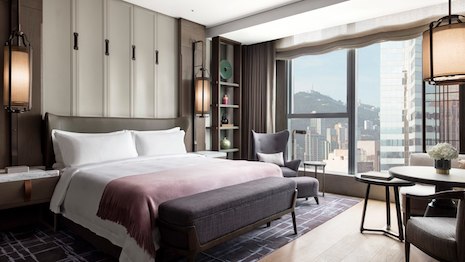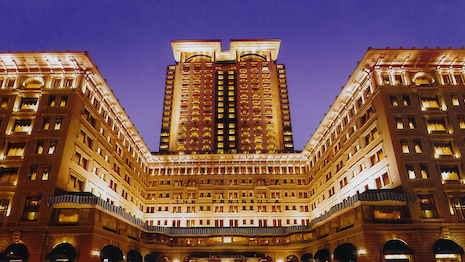Hong Kong’s luxury hospitality industry is starting to suffer as widespread anti-government protests in the region approach their third month.
As interactions between protesters and police become increasingly violent, some nations have issued travel advisories to warns citizens to exercise caution if they are traveling to Hong Kong. Tourism is a leading industry in Hong Kong, and many luxury hospitality brands have ramped up investments in the area.
“Safety is always top of mind for tourists,” said Chris Ramey, president of Affluent Insights, Palm Beach, FL. “No brand, regardless of whether it is a luxury object or a city, can sustain consistently negative news.
“Between television and travel warnings, the plummeting hotel occupancy rates shouldn’t be a surprise,” he said.
Hong Kong hospitality
Protests against a planned extradition law with mainland China began in Hong Kong in June, with activists accusing China of restricting the city’s autonomy. Initially peaceful, demonstrations have resulted in city police firing tear gas and rubber bullets at crowds on multiple occasions.
Although the original piece of legislation that triggered the protests was suspended, rallies and confrontations have continued into August. According to published reports, protestors’ demands include democratic elections and investigations into police brutality.

Rosewood Hong Kong. Image courtesy of Rosewood
Some of these violent clashes have taken place in tourist districts, including in Tsim Sha Tsui where the Peninsula Hotel and InterContinental are located. The new Rosewood Hong Kong is also located on Salisbury Road in Tsim Sha Tsui within the Victoria Dockside arts and culture district, while the recently opened St. Regis Hong Kong is located in Wan Chai across the harbor.
The proximity of these events, as well as the duration and scale of the protests, has raised concerns for travelers.
“When situations like this occur, as a travel consultant, you want to keep your clients reassured that everything will be okay and that the situation is temporary,” said Kim Riches, travel advisor at Tzell Travel Group, New York. “However, no matter what, you need to offer solutions and be realistic.
“You need to keep on top of the situation and keep rebooking flights in anticipation of operations being reinstated,” she said. “I have only had one instance where a client moved things around to avoid Hong Kong; since it was a trip of various stops in Asia and was already in Japan, she simply eliminated Hong Kong citing that it just wasn't worth taking the risk.”
According to a June report from UBS, tourism makes up more than 80 percent of the Hong Kong market (see story). A prolonged slowdown in tourism could therefore have serious repercussions for Hong Kong’s economy.
“We are concerned about the effect this political uncertainty may have on our results, especially given the proportion of our income which is earned in Hong Kong,” said Clement Kwok, CEO of Peninsula Hotels’ parent company the Hongkong and Shanghai Hotels Ltd, in a statement on Aug. 7.
Tourism, especially from mainland China, has already seen notable drops, impacting hotel occupancy rates, per Reuters.
More than 20 countries, including Australia, Canada and the United States, have issued travel advisories for Hong Kong.
“Since June 2019, several large scale and smaller political demonstrations have taken place in various areas of Hong Kong,” said the U.S. State Department in a statement on Aug. 7. “Most have been peaceful, but some have turned confrontational or resulted in violent clashes.
“The protests and confrontations have spilled over into neighborhoods other than those where the police have permitted marches or rallies,” it said.
On Aug. 12, Hong Kong International Airport canceled all departing flights after its main terminal was crowded by thousands of protesters. Demonstrations at the airport originally began as a sit-in on Aug. 9, with some protesters distributing pro-democracy flyers to arriving travelers.
“Tourism is effectively dead as long as there is no airport,” Mr. Ramey said.

The St. Regis Hong Kong. Image credit: St. Regis
Luxury properties have released statements to reassure travelers already in Hong Kong.
“The Peninsula Hong Kong management is taking maximum security precautions to protect our guests and staff, and we will do our best to ensure minimal disruption to guests inside our hotel and those arriving at Hong Kong airport,” the hotel said in a statement. “The Peninsula Hotels takes the safety of its guests and staff extremely seriously.”
Looking at luxury
The political unrest in Hong Kong has also impacted the luxury business at large.
The Savigny Luxury Index, which tracks 17 of the biggest luxury companies by market capitalization, finished July down 0.3 percent despite a slight bump in the middle of the month. Strong demand in mainland China helped propel sales growth, in spite of continued trade tensions with the United States, but investors remain concerned about prolonged protests in Hong Kong (see story).
About 11 percent of Swiss conglomerate Richemont’s sales come from the Hong Kong market.
For the three months ended June 30, Richemont’s reported sales were up high single digits or double digits across most region. However, Hong Kong’s sales contracted, due partly to the protests as well as the strength of the Hong Kong dollar (see story).
“The fallout will last far longer than the protests; travelers plan their travel in advance,” Mr. Ramey said. “Even worse, the brand of Hong Kong is damaged.”
{"ct":"zq5f6ZEN6sVt6Qs1uw4f\/gwTLuRE5IuHgTBuSwCy0\/oE7YsHv8HgUbZbxlVpE\/pN5R5bWqgl2e6\/PIFzBhywzqUpeFN+nhmkatbS2bzkQBtrIp6QBJna6fFRLsd\/AnA918c8PH+VSRNWBc02hwXPXwviF2bI4bk7wtFeO8iAl9wsLJCSQeHtsmSd1c39RPZpmqyXTSzsLnna3qdOdGCCM\/Ui\/e6EUYrFAAsCzOGkJJLpU\/kMTv9zV5lG40Wz201srGZOI3dJ6gecYRnrywRWyMIFv7jIFUCGNC7AOb7zGfhW5HJYbR5aPDU0jI9wImd\/SF\/3wFNdL5VW+a6UCAaEtjgESBlNDn99\/sGYMOH7UpvEvTfSwnxQcwBaA+36bD9T5vWVpERH83tF6IqMKeSBBQEjQQhqac+SsPV3MOzBbUfuMWp5FTkE7c26W7c5GspYJ+1ATAh6URa0JNAxRzjOJWj152Phdx70VZw7f9cNQCP0mwHPM+gi8b+Osi6nSmLJgDE5dIDHRRd9nMBWFZV786tR4Ngc9CS9HAPTietyyQJhkwb10g7CLW3N\/lAljmt1IRAVK+9pskfl\/rYtVVeR8\/RsIRd01iUjtDdrNOo4nA\/Y7lt\/Fa2G0vhc9VPf779jH6wDqkxxLhYBNoB8V5rRsX695C2qhgZTDhvQa2vQjOh02GtYv\/FkaN\/aZrzYMRj9F5w4xnn\/poH6kAdjLrr4bQ8QfCQD3SOYQJTCGpUbGpRGJfLajmssm\/sL46oFSbikadm8t3bdVf5WzQ1\/LwMXJrNsjVwSeAyxsDDHQTjZI5PxuPiSqbM8kporsugvZvc1mt5bFJ3GrRJMEoFI3ag0eFvX1cBh0vjVSkXa\/uCSL1em5yMs7qLLH++7J+H\/z+qdr7em+EkjwxD0598DcCarHZJXPET5YTwWtP5EXHkio+AZq0uj+QNH6LUH2fWnFqNcFQBH9bvPr+raF8wUJMK1V2mUhQkRdJc6i0PpfvNavVPMB95cNvc0fNIbkKIR0Lx2z+RZaQ0jNBtFjCoRhQKpTbee\/jG4VQIvx\/joBy4k8DJrAl2PWBw1\/qxE3zs51CE1AiRjpl05h9\/MhQdmA8GOiD40FhgobhNAFrAafV6jeRbDtN\/g3JSxVm95lmdp1liiZZsCRqfdMd\/zxBSudQpNSlwUp3SNl0U4l+WKaQgX1SyLGJjONpJ9BwzYTxwehAzCYi0BlmdDIGIcVRWB1zjTUyc+d2JFSxnGVFDO5ige4pVVmKBVO6omVH\/St6n8PmzbPmXMMUz+imm1BzTzMTfIZSIVWFgRKszRNWGnSqbJFEibTrxx1mi0I9VDldtBYOaR0LsXOKwTzDlQ+FcdV0oB5rnPPH82ItacMzX1vjRR\/wAt0DlQ7WPlAcXMbcX1qoiEINTjU9G4ctT0BKeCoo1aibrt1zErB3YDCq86Ms4EHwGfncYVW3c55\/zb+j\/4A88tjLFr16Dfu34J7PtK9SgGF7NgXzqI8r0sQkZ3GOxGZH1yaZKEZ2opXMKIptzMCQyBg0WAV+g8JEVHK51LtwwDeLjPpwbjHH4XIdglzpog9mA8kVBPe2KhGGkxPT0twqNJrfXzvbDTd6cUCAzz\/H1bW19MLOFW6GxyLPq3Z3jTrHRR5APpdYGK2TJWU2RMjtDLaiu32\/E+rC43NHlkm2DNEKg9xrP+I5NJr\/AUAIRIC4NsEen8kHdlOkD3azvElrVEsjRxdJJnQ00ISZxtywMfdomS9oCwyehvMx5WGXUvyvsTn85IAdb2fb3z7qoRc\/m+Oxr1yF6hZ0bnzfhTZ2KYGpal06WAthCkrAVjgKGGTFJOI2wGrDyzJp\/eD3rD+0D3eHdMoXD0sKV1XxRtOMgU\/eyb+w8URJCQul\/XMByPu3l6+P4LvmClLnGJ6CGD9KekGiYjE8x1\/l2qPuQEJuKb4HH2Q48iJkwHr8gNStvuhhbFR4WfjQ8+T6NCYQjJY6xQTt+ol6oDRp5nbHfIsIC26EfNKmGjnRMv47yvWPUW02ZcrSySCoK9sRQBwpqMehbgeUrPQosFRlo9f0JtJFmGfPKuulGF+cDPCyzYFG35kFDXOG\/WRzjV3nlnQaUcZw364eo5InJ0Bh6bAUKWSBEdgtGhKSnr\/dXHD4GGsI8mCYimkDUeAkdNb2vjhHhdWD\/RQzTRTGTVtkn1PSsTr5f1adOaLCqbKB+VvpQ50iulBf6N82Y1CxZg0E\/iQhCSaghx18j2Wx1VkuOzw8Jbl0+qaCfoSdAi2lx42IfYB9qxGFyAlnAdMBuo1z7vuTPZkRn6ct6a5JrrZzFByc3SYIv+duhDHM0BeOyhMn+SsgeeARuJBubPlaoiCmwBJC\/9c952dpPwJge1tImwIQwrThiIxgaJU5ZOpJve5SlfKGGW6O8Q3BYjaTcgGZRHadFY3w7xelq2d2xMU1DuuVtTDio5+oBv+23VRmMO9LKge+zyHjwrc8nTjRJE4n3TvubV1fJhYL2344hC63HAsxWgZAtmyRQB6STfQRvlitvDoB9bK4I2oRPD5fFDLV4ydjeeRxIhQDj\/JV1\/7Kk1M2p000jX2GNsJLY5kFva0edLi2vKqYii3dgKSfTGql1XsxM6m+Kj9NbN4j5ZqGRtQ89pVTe+HdrIvbvLAgs+N7dvtuMqLpBbewDL9\/pziHMu06LkUOh52cK0lbBh6R6OTQsB30l+lCk0p2OiVb8wJkAPhbLLdq4JpOMK1icvsigYoOMg4IXq+7ntIXIeJVpctjinmvQLloF2ia7SOyE6HADdRiT3rEWKu8jWJZRdzxp1+zdBA3vuvJkfagr2i4zeVN74nsSdV168Mn60dnkCcYjOFnYctmyvwXCuZU\/4dwtHuavX5CWhAmo3cVOromTBjf4TZO0rV\/Sb+NHgLafAcan77Wl1VpTf34q1ikQS+AExWRyZcUStUto1SlCKdfsoKswyeDNF5ukxE14VSwnNqlszMH1FE1icla+ygaZxPpVblXsA0U79JRyyvpasrx\/oFbrAnuxbP4QJwuxW0gGrdOFTChhPfATRLUYVVS6vkzTk5DwVn1AzqihJ\/5zD+vPCuSdpuTEQXxQVw8L\/luHHRMjOSwUsrno3vHU1yGlApzhHWeXh7tkyxMZXCY+aGVWCTwOQFeIu7Q2teWpwxLcQZPX1bfXtdhGNurpdJZ6hcaMMjXg93OTk7vaY4KpVUDVnZpJbTKIcRa2ykCAnO7hfk0ikUB9XLLrmyWnSoaa1kbI1xNxNBaaPoBc1LAxGlHVNfefoh8nj4T+o4S342XHURRFqzc49FyPuIVDTmjQ3Au2F4m5ktcDgM9G5oRT\/CEm0EOlRIZcZJZEtlfli70MpiTcVQEcKHpsIoHk2ljGiqFiKlhE98rCbZKWm4pVCTOc+rC1hCmESW8Bb2EWnVHm6FMVFHjVr8GDPOCHGMHmi1XvfuptoN3+FIXhB1s2HZJmb9OmWmMWGw2NozSwrR8F6nMmGI5osAFA1vsciMbcjBwBfBXlcMqduoF9nEo3nJZ1ZhvbiNQqG9TWxaBrfzyvrfoipjroVr83CSGPnOZF\/lOU\/5RgM4w2M1py8FeOh00mjjkiEbgrBvysj3QUl5b8WWbobEKLP88pqddxhDT7CLX58vL44OFneY+GZdjYQidHCscm361XIgaNiA0E\/dh4vMDWFQL0Y2c+jrzniioDM2K1NKnvXoHVGndTTV2bRNtldO8zvT\/ZZGAM6RF9wczC1t46acAbd7LdJ25c89IN05Jj0gVItSeJNRb\/1N\/9enHYeQUWvvefNY73ZLilw6EBtZ6mYfCjdB4ksainNjs0Vvpas5hYRv5A+RSzBh9MA4jk+yR+R0AKK1VXVcXbqbMwXQLtRAbd9e+oFqichH3xrHULXvWOrFqYcTcKULGlpQe7f46ekJMsaaDELBkWmPPEzHKArm4VPmMofzZTRIYAS7KJusyNbFvakI63lsBJkxvFNy7AI7PBQ66ec1ri33wvmlreLo4Jon0y5HWxIK+tO2qcJXUL\/pbIcj4p5dJkELqZ0hYcO2yRj7n3zE6Dqlh\/qH3U3QVn3Hak3PwnI0b4CwmgLkvU9ErQ0o3khg76XMqrjqWR\/z80QOBkstuHQCKT1dcPS6E2Iq6lWG+VaD3u9hXnOWLcopeXyBgI501oyh3fy\/0Nz3iMvQpR3WC6wJLXkHDZib7SaOZ3J6OY85OjpEq2+pKRWXKefaW3epe8O0Im9rj9UwUH1qjCwjbi8I4CI2ITgc9BCiC7yfpx+nu\/zM2YzgeeCLkJstk6cbywxjSzzcuMDNYDVNe\/6uJGKRFoKMV2XVJ3Sjff\/3e9QghafzNTJMgMJ9j51goYyqxX0O0ukZA9IZNehQJtnWsG4uyHQ+4GmX1HTPaeG3MLCyCcjmFBnqNjRRy8M107A6Aj5Urnwg5riR6FBtRTuX9VfYhByvMpIfYHF1ErId3nVqtygZa0aExXkSsw3D5FoTyTDUGzUr5zjyvJsDeMlxdE\/luLIKB2Cq1DnvwO0ttp3uQBH4tK2zhLm8IGyWmOd0coMDvnkzRtJWOCWP1FZRWC3FXsp25B548ZGaKPSfoQP1UFhv5grUTVJWccxw9x7ppvabh7VbD\/INoK4IPOYuphN0EJDgLh0yBkfwHrfcZVRLSvVLF9JAHRUm6SBtCIjJKpaevcmm0a7txy8pL\/V8fxZGlSf2BmCKK\/g4vGL6baSm73J7mfImS7e+h9wwatHxo8rRpY8R7yX8DqFWjy4DhLy6\/7yuJmJL8jlnKLM7s+udPNb4xs8bcrIL964advVyhcKVto6CVRUgKssybNQ0U7dCD6+wcbyypJbrFDFdDCs2krOlZRXQyr6ciPdc9yThsoT5BXtQ4Dsoog\/u+mBt9uaWcM7KgLdi9Ylh4sgH30uDuaEb8kigG1icBy4tQdLVi0VS66EdKpNdXp3rgBqJXKgrnI7pE9s\/rBtY7zE\/H3JyLH5VoQfplA06uYa\/dkbCyxJ6KATlhgaXElP31aMswAPjtIz7b4VkvupyWGsegotWZ\/0gszg87EpAZ8dsGKan7zAolmAWiImnqMAcQjuolSUMMW7M2SMXnNX6MNzvzcn9rt5VtgH\/7pdbupGohtSldMvkxmQ17krqhf3l5JF2vZAMbn03aBo4aNhw\/bBoSSkBrlHxdHgvHO2so0su0mQr5PZ5+rsCBtmishcSGz4yjHSw5NNTCrD8MKc0kbYFJStSX9yNmTQp8UigrhgxdupMcWA43FJo+a6IC8pHQ7j6JQMg3Vqxl\/nFuz6oUmvjbYChnbdvYxAnzqu6iJcUfrCiHmBislrUz6g2PON\/sbeIXVQzn4xW6d2gXVQ2rb5oyK1P+WU0rg7HrRiubkcT\/aRrx894nBaQbaXd0vWfgPo62dDqdeovUcO6ZUQp1resjdA7l292RPrh8pNJ2k5lhfvsitqclqbPZZ1xa0J\/rmMkGlWpOzhjw1i6rWLY7S2Bp6i8DV12iSaBAmrk6YOW5QbcoFSYZaeNHpeaclV3Sxd3GUNzImyUYXBqEzEZ7bce5Y\/vFnTLVpxcMwZIELhn5wyuDHlnBg6TV3imbboYwFo7GBXV8hXhSOESARI5ZL4qpFn6Oig\/qEKaDgooED6gK4\/kvyjMigV7d4cYYzN8NvnTIef1BfnKycihIPiA3hCwxEUmuoq39doi4wIzlFd0Xv6yzY1qD8UDw7dCTveptlob59heIEPRgAjcFw3HqHewcADLjhrmVcBgIqRnzseuAf7L7nLlUCNm6UrHUxK2BIku\/PlO\/RnTlwP+KHg\/H4WGJ5kpbSCufediZOeViZSCxR3DnjCPyZJ4WhPNc\/\/KA45pQ7sumD2qRQFcvUeDShmyUFADWvDkuScEkW8rQOibn6MIAT50AYS2uH5qptjihrFRScT\/GIAohEyX7XYaNT6EXjjsNMJF39CB5ScPh1vY3Z7bTj6ARKezVQX+CPTJelq6Jv0fvxzAZeORDHr0fDAYy0GLhWV0ogo5527J1mOBzVQ4ONa9Ed3xYyii8bPKrdIFcldcowRN9MP1wohL8YWMaFnDCkFSWhZkge8a7ObZ\/EUWumuTmO+9bCT9BhQDqKHUcoPAMFWA0kHWOhoWWOcVr7MMv1CzX35c4H6qDWalxtTQPuEp3\/Q2Qmv1pkjWJkul5UhmQeKPe3OJduG1f43B14IHAOE7WTSDK8Av7WdHhli6hNVNINoEhAk28amIeHKMEdEjXYzc7NuCEKsgFFRZU9fGjqAwwa\/DZv9C4s7nNY\/R608KApPel6bx8RmHRDN6a\/TlTctxyZ11rGRUfyOT3u4Qut6tXG6r9EXMHRY+w0gb\/EAI8arodjhFwFNb57qCMmfCi96YkpnOoGD7\/THMx59y+K9WJyep4hyzMEbKBs9eJyRX07wzsT8\/t5uWVsp7S3NBP80sp12S+QI5NOK6L3CRY2tIWI2ok7ZXVn0FaJK55xaGYLpcd1Oa7WOjQzk4rldEr1Ejq66waO0c2H6FNJjQXh2zBXabvLSJDr\/0u4lzxLKPH7kPjfJX4RV\/jGeo\/\/l6ZQtKdcdnbLqoOyAYI0irHABKWX39aMJNfgIvyVW0+UUBE7A0wPI81vPlEGRQKP5jPwbDOPePkmhp1Yju0If0CZab++AuF1pWdks0CnEYI3IKcm8HkaTCIrchmcImlqvqzeg2a\/+fsH4RugCJjFhwdht4AWJ+GzSd9+frHG4x8YhzdH8qgd9UHTHK5iTMhLtrUgyw9jd8BLm62PVhB3M5XSGxexE4kHStYLnM85YH4m2mcWNNrwtsbE2pRLf\/24oNRDAfQ9DzNoCrdLvZky34OsLSouR9LZlpuCsKp8VAIMhOIcJ9uKeaDNcL4TwDlbMhNIqVNUXIE0CoOIF0Dqsb2Io7zvTY2yIN+BLx29NhkxdIkikqisrT+JgHG\/GOImYvZ+1XMqs+w787PS9gLeqYQxrJD7HCrG3KEQmkeef6vSshvpyl3sRcbtYHEnEH2KOUtM+dK16zLHIOv6nIsHr5a3KtfIjBBesLDARTBcsibZYFp1QSUtN40MysK5t1ACkWyNZLXQLftmQHIRs2nPPLZyOA2zBkMTMqbIKghiZS6249\/ey8XLIdsc1OWWDkIG8298xRcBFhLq+byNOZHAXrcatpQdO5wgDCtB9G6YFkJMoj\/ghiPje3JBn4Hxl\/QulrhXzlCtlQBGP4gRY8FBtcrHRscshY4rHkJX6rAzuPNlhf62EGIJYjpZ4WOQJRLlXAKMKRDQ1t5UfP7mqb7Yoc+llDEYpDtD1pPai3bzsxRewK65yrqOSQw3W0MCMu4zL2IC8xDR5\/4WFdqmnc9G8FFgiJ0fEVYp4Xqtnk8WxaW2MCMRIpcCuQzn1+rlBlTUaLVsSjfx5xW+aatVHiv6kbx3lEBP9gR4wSdDAUg066kGgSmP+4yNJE\/bVk\/waNxK4cX8SSydRTUEybMxkJKqe57gdQ1FVkUMnRCC2GSJHJhsolWqQR+Ds5JrCYaRTpSG9IAjEIOsU+ccDGq\/tPLZTfjnWKIp0FkMx\/rpgBHaT0R9QhO9ttM\/2CGtyS3x1uO+9OaP8BuDX4OKci\/T7oJEDu0Vo\/Esd6BcF8iS32MEdkyAFoc2Orf4YFo5riK4L+V1\/yoRa024n7N6e9WRS4ALsEiW\/+VP6xj4AqwcGhHParvSw3NQbySqtBob2q68Zrz2KC\/\/d+JlibeTu5JBFDOnu\/vsLN435BFrVK0glbN\/5fwqHxnxfyuQaD7SfIHyCf5277H4tIvsPSzI0EIw5xrCfcP7yF7m+jYR8z38BEWBJmHu0C69vEwhsqgo\/oCrJYywO1dfpRPsc2Mmtcz3RaYj6PKmTIuens5GAsdDu\/1uCuJSiXk7DQjbSZTwBzez6d4XY5poxHlGV8X4mBBG\/wM\/8pdHnbQAqVOI7fs5Tt6QS3+UR8FZQXXwMZCRoN2m\/+ZnKwXdrIKxXkuSE+E7+QT4xKDxWjf8BAt7su18j89GRuAL+YampQfNTkA0lVVJijDngFa8+VLBTN707fHoVX5EMsSvMMqBwHjB2d9VOxOEYkHTAdf28vw6P3FfFyWhb7YXz9JBhTC4fDW+ufEFKYt\/6d7+Bk69iuY77YtbpkXjdQ3ZCHUWlqELQ+q1nJ\/Rkrn+5VrGKL5KpX49d\/zGHd0AsT+K71X+d35zPL\/BtYOyTyqllUYoMf6LEqUc26v1EWPFkg5Z5+KG8a8o+d3bHWhPMX+2d\/W4vTR8NSZ5VTTkM8ln544GkGuDunOWzr8xEeqNjIlczR0OugcYSuKXx9TK1X5wqH7T1jD16TraMF+B6FRuZN4xnJ7OuM1seHq+rP9l\/BH13nDY9WWGe5F4SsX9pVFX4mRyZbxNzn2O2WWrrp8gXF4ILqUtHn7N7jK4o5Efcx9GpUO4Wsu2B6Fr\/graGx5UBhFLo+NHu+wDYJF+0fJ2Ns6YGGVvSr1r+r7myr1VInPJZ+TzmgIh3XheIrVWT\/sLc4+B589uf7on3mB2oSrVIq2GZ2W+EDBbrX5U+BD0gmrnhfcy4Za1o4o6pYK9cdiGVan5bvxho6B8FtVIfv9Ky7O7beRwPPftKaD7P7RQQhMVitmC9u7hQs0epwVMMW+EPMgia0ufjA5fwa\/xSSnryx\/6JsjwtHLdH4r\/\/X463pVTZ+gsQdfrA0aHmd0wysKgj1QbSQfKLzgr389heEj1qdGEXxG5uwfNB30E2kyMuWzWQ8IyRt2Ue4zjWFRHS7CvCHQyuAwp150f\/PWEHG3BHZbcw\/IZ\/9iOQATDteyJfaA\/CwQWO2LdSLP7ZcsitBQqb7vrPrnmHLSUYH+w5bRWU2k\/T+iCJmQkkxhsA6RNaJ7l1HWjdpbX7IyI0kC0Otj58SsbfOcSry3IOgUyhZHRLlEjCZpPo2dOBbKyZfaWdNtvdpSQvmyiyY4DVY5Vy12WXSGhjGIjaG7bh\/lZIb9tH0ZsxhwHXixVjO4VzvMs1j4fApIFszooabOzfXeW50HwKK+NW3Esvw3bJB5NS0fR2i+l2n1gdMKUK6lIZOh++fpNCvc1wAl7C\/tFPsAL5EO5AiA9TCIleC3EL9zwjXSvv7TQbYrPlVrpxVade2YsmG8Ssbs67xsmmLcNKwdcfm7USmpRguaD98rizFUQKwJzRxaMDSpjiErN871NIpExBngddHNBCV0jUgRdrGo6irSSw5UD6BPGYH9hSeaqS0W8p4WzPTlkkYkd49vLyolOe7NBbMJI14cS13WUAbvcHCdzrrnv4zlElkTwAuh41NxrNVBQsfUPkA8oq41VtgsdQIU4BPl0ge\/lO2+UjTxHvKo+4GO670bLIiuZBbw8YUx+ZRso4aCCeAY9uUlvI3K4dZY8JrRukIs8ECLfdnYwUuVy1qpJ9e2W0VHdTm8M\/Wq+r\/KJYeFkuZMwIBsCyyBvvL8onaUQVFy5nwIBBvE9w1aVFsu5ZFtQcOG87k9yBSZuqaRO3MjHccommzqkFoYMml\/8qPabAsL06bL3dbZs1op+va28p2fOp9jvU\/NPnDGhUYsXpiHO0Vw8liLnmlCA5hrBbwKn1AhABqhCpZjv5LorHITNyvKauG8UiULnKfVTu0HSgOWKWg7Gbe7EvGX+dmeu7PHDWVfDccbcol9ba2pA57eywe4ygleMIKYxZKZG2SBX6f\/6tW+IwTqu7Jmpvj4bd0ugGslhwu52hi8XMYed0w1om+GPfXPm76nqrLN4ORp8H9WY8PQHKtCp\/hXVsiBgYH4fpEJVbGHMPBIVHqBqAlOyqB2fZGsvolZmUbgfchNXZ0wNUh0KMX6ddSbkhPo5wY6svmeoYKpgvWYfw3C2y7U1o7Wgj+t0IvNgyKAYgMlzkURqCKzOvcDGehsuUJtoLpPDQGhy6CSv4qaPj1suXDLMS7n7o0nOwK4OYyJVkfkFinEPzPntGTPdIU1FKpZQ4FNt4s\/wD6jzmPVKANK52Dd6ktpwcvTlN","iv":"1083fbdc9be7b65510b25a2f7bcbf9d4","s":"2a06f22a64d22aa0"}

 The Peninsula Hotel Hong Kong is located near the site of many protests. Image credit: Peninsula Hotesl
The Peninsula Hotel Hong Kong is located near the site of many protests. Image credit: Peninsula Hotesl